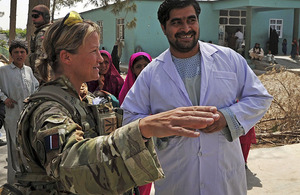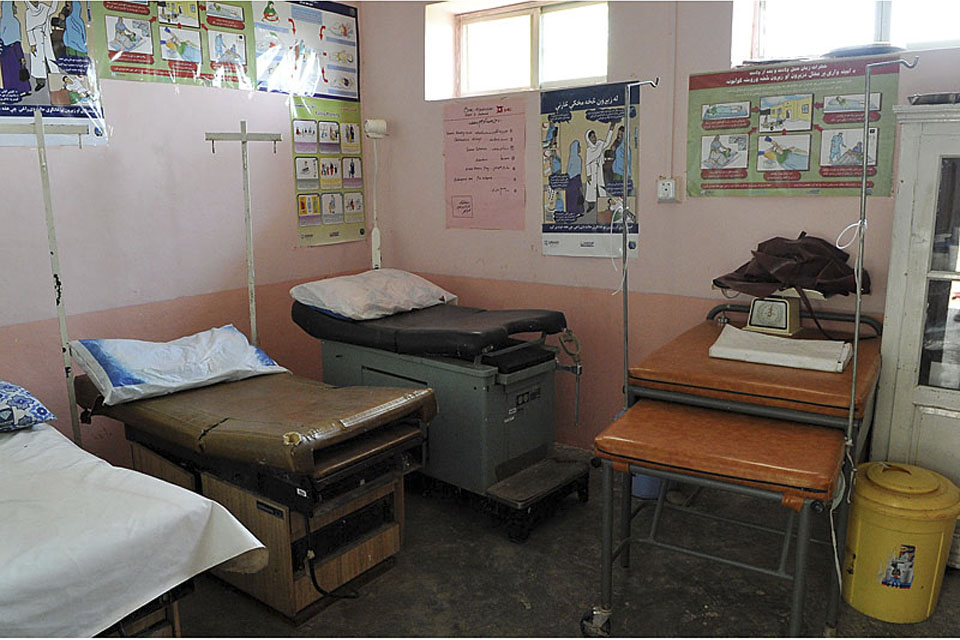UK forces help transform Helmand hospital
A hospital in Helmand province has been completely transformed, thanks to the help of British forces.

Sergeant Karen Swallow RAF with Dr Abdul Latif, the driving force behind the renovation of Gereshk District Hospital, in front of the new maternity wing [Picture: Petty Officer (Photographer) Hamish Burke, Crown Copyright/MOD 2011]
Less than twelve months ago Gereshk District Hospital was in a poor state; all of the buildings were in need of urgent repair, there were no inpatients, the incinerator was broken, and medical waste littered the hospital grounds.
Since then, the Helmand Provincial Reconstruction Team (PRT), working with a Military Stabilisation Support Team (MSST), has completed 23 renovation projects at the site in Nahr-e Saraj (North).
The hospital is now one of the leading medical facilities in Helmand, able to provide treatment to a much larger number of patients from Now Zad and Sangin - more than 20km away.
The renovated hospital has a 24-hour accident and emergency ward, a maternity wing, and vaccination and dental clinics, as well as a drop-in service for more common ailments. All the services are free to patients thanks to the Government of the Islamic Republic of Afghanistan (GIRoA) and non-governmental agencies, who manage the funding.
Dr Abdul Latif is the Director of Health in Gereshk and has worked at the hospital for the last six years. He has worked closely with the MSST, PRT and GIRoA, and has been the driving force behind the renovation. All of the work has been carried out by Afghan contractors using local materials, and this has helped to boost the local economy.
Royal Air Force Sergeant Karen Swallow is from the MSST, part of Task Force Helmand. She says the most significant change at the hospital has been in the maternity facilities:
Previously the maternity ward was what can only be described as a broom cupboard with two old beds side-by-side. Now, it’s a completely new building with up-to-date facilities giving privacy and respect to the women before, during and after their labour,” she said.

nside the new maternity wing at Gereshk District Hospital [Picture: Petty Officer (Photographer) Hamish Burke, Crown Copyright/MOD 2011]
Dr Latif says as a result they’re seeing more and more mothers at the hospital:
Traditionally, most women give birth at home, but now the new maternity wing offers an ante and postnatal care facility, waiting rooms and bathrooms, and we have three female midwives and one female nurse working at the hospital,” he explained. “Increasingly, more women are taking advantage of the improved medical care rather than risking having their babies at home.
It is not only the medical facilities that have been upgraded. A new incinerator, designed and built by an Afghan contractor, has been put in place so surgical rubbish is no longer left lying around, posing a health risk.
The kitchen, which previously had no electricity and little equipment, now has lights and utensils, allowing the chef to prepare and store food for inpatients and staff. A new well has also been installed, along with a parking area, a mortuary, a new footpath and repairs to the boundary wall.
Warrant Officer Class 2 (Artificer Quarter Master Sergeant) Mike Wright from the MSST said:
Everything has been completed to a high standard by the local contractors, providing a much needed improvement to services for the people of Gereshk. Without the dedication of the staff here to their hospital, the projects there would not have been such a success.
Those treated at the hospital include victims of road traffic accidents, gunshot wounds and mine injuries from either insurgent-laid improvised explosive devices or legacy munitions.
The funding and better facilities mean that the medical care is no longer constrained to the hospital. Various outreach programmes are also run by the medical teams to ensure that provision is extended to the more rural areas.
Dr Latif said:
Every day nurses from our hospital travel out into the district taking vaccines and health supplies to those who are unable to reach us. These health workers also spread information about basic hygiene and how important it is. The advice spread by word of mouth reaches far and wide.
Dr Latif and the staff are keen to further expand the hospital and provide even better access to facilities for the local people. Sergeant Swallow is confident this will be achieved:
This project has been the greatest success project which I have been involved in during my time with the MSST,” she said. “Dr Latif and his staff are fully committed to making further changes to the hospital, improving its service in the future. It is obvious that this facility will be sustained well after ISAF troops have vacated Afghanistan, which makes it the success story it is.